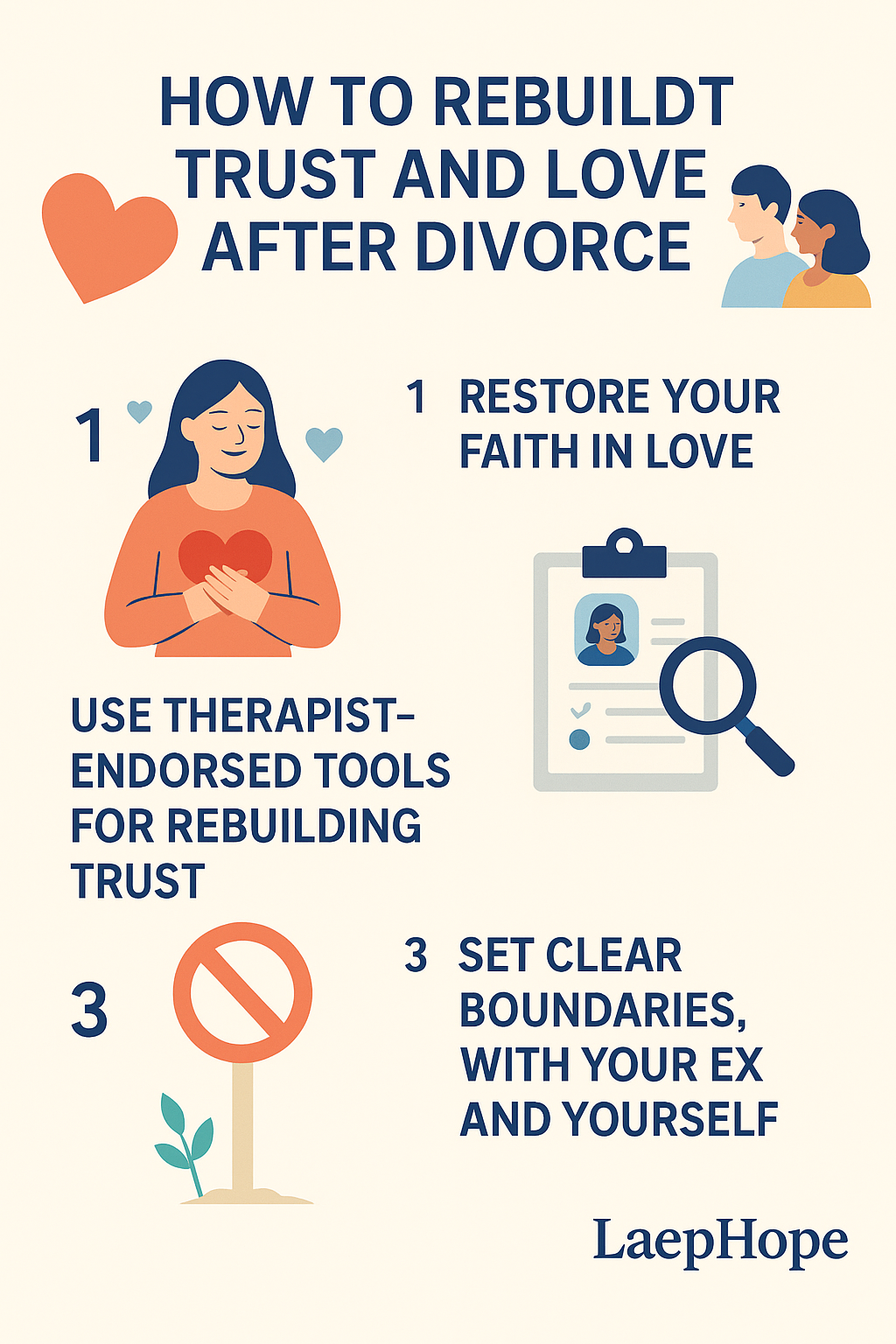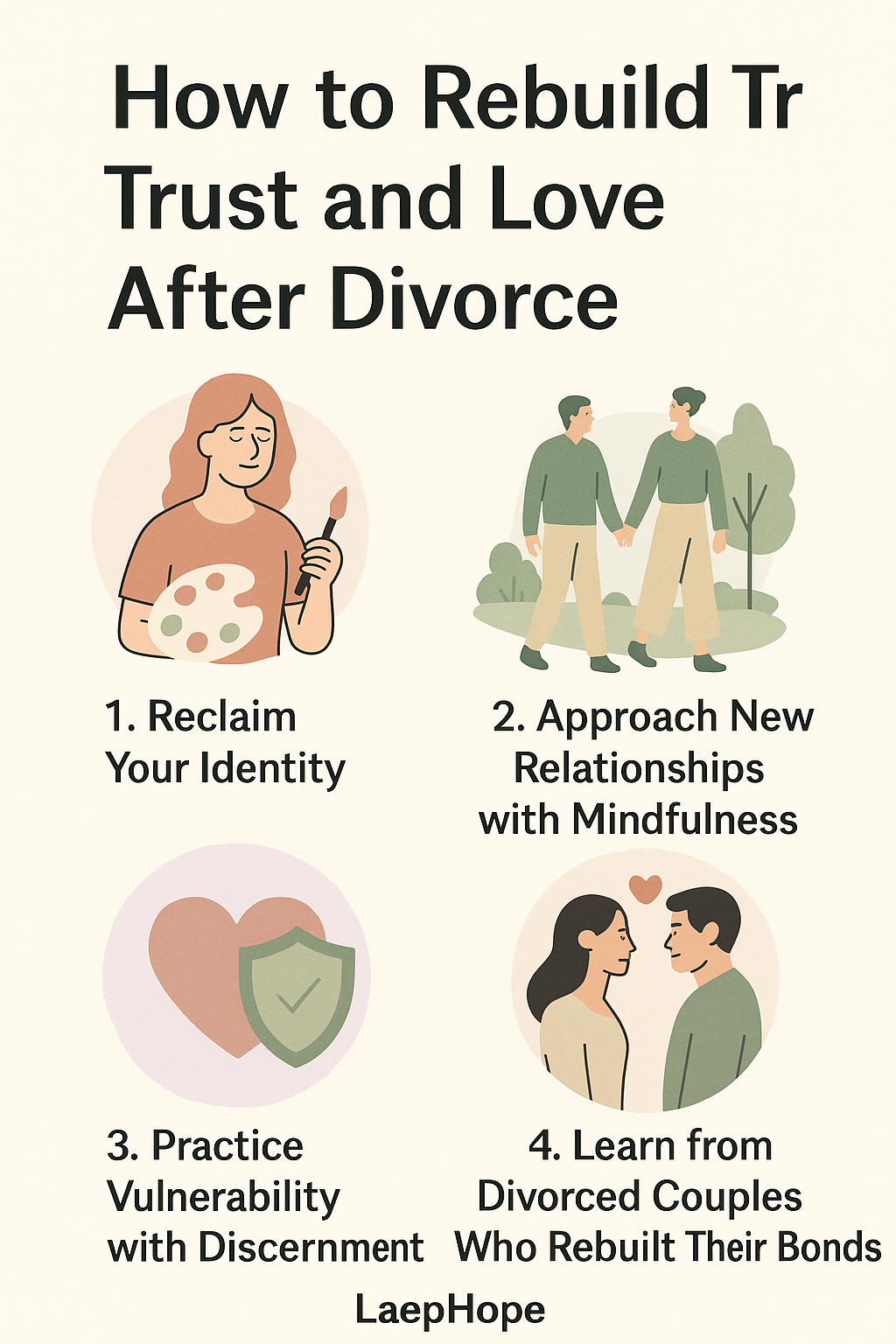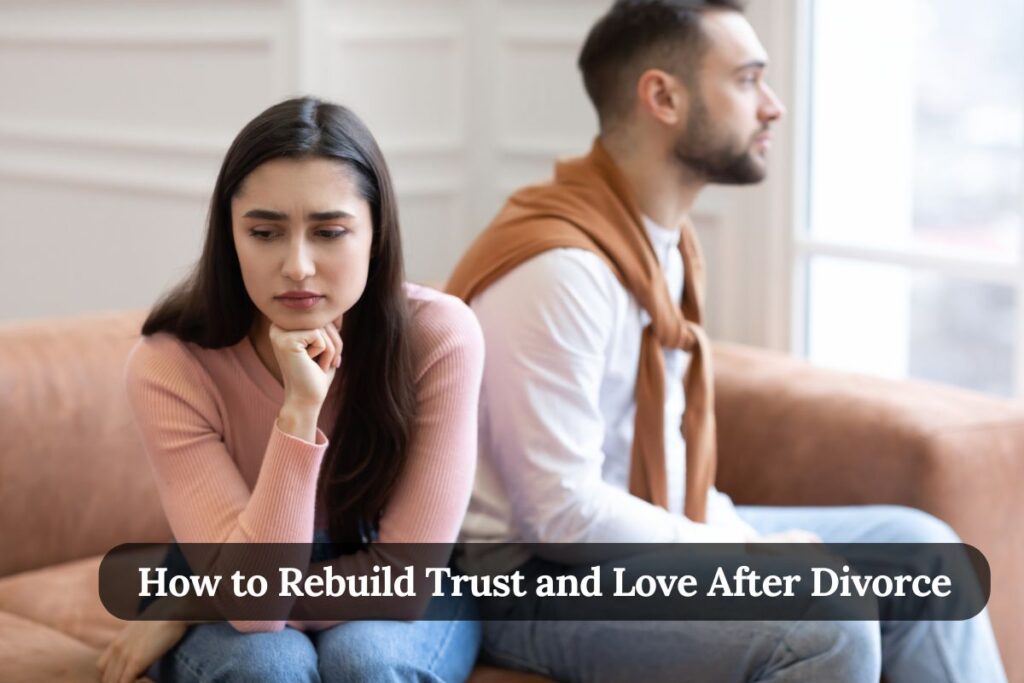Rebuilding trust and love after divorce is possible, but it doesn’t mean returning to who you were before.
Healing works when people rebuild self-trust first, understand what broke, and allow love to return differently than before.
Divorce doesn’t just end a marriage, it leaves a mark on the heart. It can shake your sense of safety, your belief in love, and even how you see yourself. Trust may feel like something you’ll never offer again. And love? Sometimes it feels far away, like a language you forgot how to speak.
But healing isn’t out of reach. According to the American Psychological Association, about 75% of people who go through divorce eventually remarry, and many report higher emotional clarity the second time around. That’s not just about moving on, it’s about growing back into yourself.
This guide isn’t here to fix you. You’re not broken. It’s here to walk beside you, through grief, self-trust, forgiveness, and the quiet work of rebuilding. Whether or not love looks the same in the future, it can still feel safe. And that’s where healing starts.
Can trust return after divorce, and what does that really mean?
Yes, trust can be rebuilt after divorce, but not by trying to return to who you were before. It begins with rebuilding self-trust, understanding what broke, and setting healthier emotional boundaries. Trust returns gradually through consistency, emotional safety, and choosing differently, not through forcing forgiveness or rushing intimacy.
How long does it take to heal emotionally after divorce?
Emotional healing after divorce typically takes 18 to 24 months, but there is no fixed timeline. Healing depends on the depth of loss, whether trust was broken, and the support available. Many people feel functional earlier, yet deeper emotional clarity and safety often develop gradually over time.
Is it healthy to want love again after divorce?
Yes, wanting love again after divorce is healthy when it comes from self-wholeness rather than fear or loneliness. The desire for connection becomes unhealthy only when it’s used to escape unresolved pain. Healthy love after divorce grows from self-trust, clear boundaries, and emotional readiness.
What Rebuilding Trust and Love after Divorce Actually Involves
1. Accept the Pain and Allow Yourself To Heal
The hardest part? You can’t skip the hurt. Healing starts when you stop pretending you’re okay and start letting yourself feel what’s really there.
Divorce hits more than your relationship. It touches your identity, your routines, your sense of safety. And if part of what you’re grieving is how emotionally unheard you felt, this piece on when your partner doesn’t understand your emotions might feel like a mirror you didn’t know you needed.
Let yourself break down. Let yourself rest. This part isn’t about moving on. It’s about finding your footing again, one small breath at a time.
2. Understand What Broke the Trust

You can’t heal what you haven’t looked at. And you can’t rebuild trust, especially in yourself, if you don’t understand how it first got broken.
Sometimes it’s a sharp betrayal, like cheating. Other times, it’s years of being unseen, unheard, or slowly pushed aside. In both India and the U.S., studies show that infidelity, emotional neglect, and poor communication are among the most common reasons couples separate. But stats aside, the pain always feels personal.
If trust was shattered in your relationship, this guide on rebuilding trust after betrayal offers a gentle, honest starting point.
Looking back isn’t about blaming. It’s about clarity. When you understand what cracked the foundation, you can stop questioning your worth and start figuring out what you truly need going forward.
3. Rebuild Self-Trust Before Anything Else
Before you can trust someone else again, you have to believe in yourself, your gut, your worth, and your ability to make choices that protect your peace.
After a divorce, that trust can feel shaky. You might second-guess everything: what you missed, what you allowed, what you gave. But healing starts by proving to yourself that you’ll show up, even in the small ways.
Keep one promise. Say no when you mean no. Let your needs matter again.
4. Restore Your Faith in Love
After your heart’s been broken, the idea of loving again can feel… heavy. Scary, even. Like touching something fragile you once dropped.
You might smile at the thought of someone new, but deep down, you wonder, What if it just breaks again?
But believing in love again, slowly, cautiously, isn’t foolish. It’s brave.
You don’t have to rush. Just let yourself believe that love can still exist, gentler this time. Safer. Built on truth, not pretending.
Maybe you’re not ready today. Maybe not tomorrow. But even the quiet hope that it’s still possible… that’s enough for now.
5. Use Therapist-Endorsed Tools for Rebuilding Trust

Rebuilding trust, whether with someone new or after a betrayal, isn’t something you rush. It’s slow. Sometimes frustrating. But it’s possible.
The Gottman Institute found that couples who work through broken trust often spend months, sometimes even a couple of years, relearning how to feel safe with each other again. And no matter the timeline, the healing usually starts with the same quiet things: honesty, patience, and the courage to keep showing up.
That’s the work. Not the big gestures. But the small, steady moments where you prove, “You’re safe here.”
6. Set Clear Boundaries, With Your Ex and Yourself
After divorce, one of the kindest things you can do for yourself is protect your peace. And that starts with boundaries, real ones. The kind that don’t just block chaos, but help you breathe again.
This goes for your ex, especially if you’re co-parenting. Almost half of post-divorce parenting issues come from blurry communication and emotional spillover. And honestly? That makes sense. If communication keeps turning into conflict, this gentle guide on how to stop arguing might help you find a calmer way forward.
And boundaries aren’t just for them. They’re for you, too. Learn to say no without guilt. Learn to step away when something feels heavy.
Boundaries aren’t walls. They’re doors. You get to choose what, and who, comes in.
7. Reclaim Your Identity
Divorce doesn’t just end a relationship, it can make you forget who you were outside of it. For so long, your identity might’ve been wrapped up in being a partner, a spouse, someone’s “other half.” And when that’s gone, it can leave you standing still, wondering who’s left.
You’re still here. Maybe quieter, maybe a little bruised, but still here.
Psychology Today found that people who return to old hobbies or try something new after divorce often feel more grounded and more themselves again. Not because they’re “fixing” anything, but because they’re remembering who they are.
So go somewhere alone. Pick up that old sketchbook. Take a class just because it sounds interesting.
8. Approach New Relationships with Mindfulness
After divorce, it can be tempting to fill the silence with someone new. You just want to feel wanted again. To prove to yourself you’re still lovable. And sometimes, it feels easier to move forward with someone else than to sit alone with everything that’s still healing inside you.
But starting too soon can leave you more confused than comforted.
And when love does return, let it meet you whole, not rushing to fix something, but ready to grow alongside you. When you feel ready, these gentle reminders about what makes a relationship truly work might help you build it differently next time, more intentionally, and more in tune with who you are now.
9. Practice Vulnerability with Discernment

After heartbreak, opening up again feels both hopeful and terrifying. You want to be real, share your story, your fears, your soft spots, but you also know what it’s like to have that trust mishandled.
Esther Perel once said, “Trust isn’t rebuilt by grand declarations, it’s earned slowly, through emotional presence and consistency.” And she’s right.
The people who deserve your tenderness won’t rush it. They’ll show up. They’ll stay steady. And you’ll feel it, not in their words, but in how they make you feel safe just by being there.
10. Learn from Divorced Couples Who Rebuilt Their Bonds
Not every divorce is forever. Some couples do find their way back to each other, but only after everything broke open, and both people chose to do the deep, honest work.
They talked more honestly. They went to therapy. They learned how to meet each other’s emotional needs in ways they hadn’t before. If you’re considering that path, these practical steps for rebuilding trust after betrayal might help you begin gently.
But even if reconciliation isn’t in your story, there’s still something to take with you. Growth doesn’t need a reunion to matter.
Final Thoughts
You didn’t fail. You adapted. You survived something that reshaped you, even when it hurt more than you expected. And the fact that you’re still reflecting, still hoping, still trying to understand yourself, that says more about your strength than any relationship status ever could.
The second chapter of love, whether with someone new or within yourself, isn’t built on illusion anymore. It’s built on honesty, clearer boundaries, and a deeper sense of self-worth. It’s quieter, steadier, and far more real.
And if part of you feels unsure about trusting again, or carrying old wounds into the future, you don’t have to figure that out alone. Online marriage counselling can offer a safe, guided space to process what you’ve been through, rebuild emotional trust, and understand what healthy love looks like for you now.
Whether love finds you soon or much later, let it meet you supported, grounded, and emotionally whole, not carrying everything by yourself.
FAQs About Rebuilding Trust and Love After Divorce
1. Is it normal to still feel hurt years after a divorce?
Yes, absolutely. Healing doesn’t follow a fixed timeline. Many people carry emotional pain long after the papers are signed, especially if trust was broken or love ended without closure. You’re not behind; you’re just human.
2. Can you really learn to trust again after betrayal?
You can but it starts with trusting yourself first. Trust isn’t about forgetting what happened. It’s about choosing people (and experiences) that align with the version of you that survived.
3. How do I know if I’m ready to date again?
Ask yourself this: Am I looking for connection or a distraction? If you’re dating to avoid being alone or to prove your worth, it may be too soon. If you’re dating because you feel whole again and genuinely open, that’s a good sign.
4. What if my ex wants to reconcile, but I’m unsure?
That uncertainty is worth listening to. Some couples do reconnect and create something better, but only when both people have done the work. Reconciliation without growth often repeats old pain. Trust your gut, not just your history.
5. Why do I feel like I lost myself during the marriage?
It’s more common than you think. When you spend years prioritizing someone else’s needs or walking on eggshells, your own voice can go quiet. Divorce can feel like a loss, but it can also be the beginning of remembering who you are.
6. Do I need therapy to move on?
You don’t need it, but it can help in ways friends or time can’t. Therapy gives you a safe place to untangle pain, rebuild self-trust, and understand your emotional patterns. Think of it as a gentle space to land while you figure things out.
.




